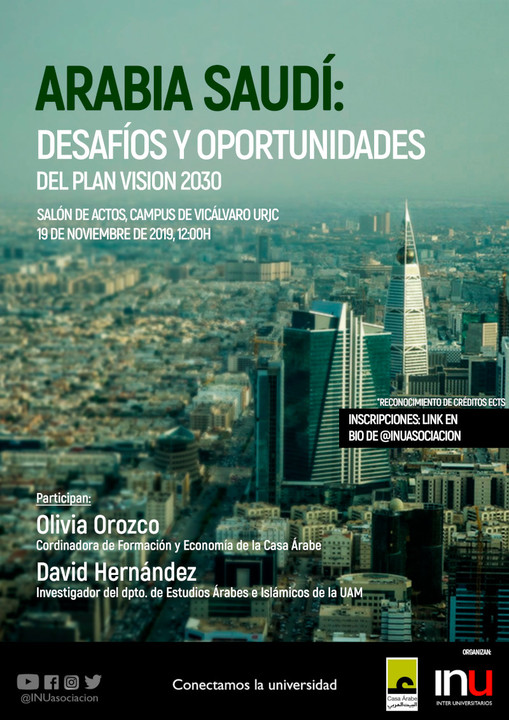Conferences and debates
Index / Activities / Conferences and debates / Saudi Arabia’s Plan 2030: Challenges and opportunities for the kingdom
Saudi Arabia’s Plan 2030: Challenges and opportunities for the kingdom
November 19, 2019From 12:00 to 2:00 p.m.
MADRID
In the Salón de Grados of the School of Legal and Social Sciences at the Vicálvaro Campus.
From 12:00 to 2:00 p.m.
Prior registration required.
Register using this link.
The Universidad Rey Juan Carlos is hosting this conference about Saudi Arabia’s economic policies. It will be taking place on November 19, and registration is now open.
After undergoing several delays, Aramco’s trading on the stock market, as the largest oil producer in the world, and the successor to the Arabian American Oil Company, was finally announced by Saudi Arabia on November 3.
Its partial privatization forms part of the economic plan known as Saudi Arabia’s Vision 2030, announced in April 2016 by Prince Mohammed bin Salman, as part of a series of extensive, complex reforms to be carried out in the upcoming years in the country’s economic and administrative structure. The basic goal of the plan is to transform the Saudi kingdom into a competitive power adapted to the needs of the modern era, having come about in response to the changes which have taken place on the regional and international stages.
Saudi Arabia’s Vision 2030 forms part of the particular political vision of Mohammed bin Salman, named by King Salman as his heir to the throne, on the role which Saudi Arabia is to play in the future. However, the young prince’s leadership and his most relevant objectives in terms of domestic governance, the economy and foreign strategy are running up against a series of obstacles and resistances that are considerably limiting the scope of some of his initiatives.
These matters and their implications for the country’s future development will be analyzed by David Hernández Martínez, a post-doctoral researcher in the Department of Arab and Islamic Studies at the Universidad Autónoma de Madrid (UAM), at this conference organized by Casa Árabe, the Universidad Rey Juan Carlos (URJC) and the Inter-University Students’ Association of that university. The session will be moderated by Olivia Orozco, Casa Árabe’s Training and Economic Coordinator, with the official opening presided over by María Luisa Delgado Jalón, Dean of the School of Legal and Social Sciences at the URJC.
David Hernández Martínez
is a post-doctoral researcher with the Department of Arab and Islamic Studies at the Universidad Autónoma de Madrid (UAM), a researcher in the International Mediterranean Studies Workshop (TEIM) and a writer for El Orden Mundial (The World Order). He has a PhD in International Relations from the Universidad Complutense de Madrid, having completed a thesis on: “Saudi Arabia’s Foreign Policy in the Middle East After the Arab Spring: Regional objectives and strategies.”
Its partial privatization forms part of the economic plan known as Saudi Arabia’s Vision 2030, announced in April 2016 by Prince Mohammed bin Salman, as part of a series of extensive, complex reforms to be carried out in the upcoming years in the country’s economic and administrative structure. The basic goal of the plan is to transform the Saudi kingdom into a competitive power adapted to the needs of the modern era, having come about in response to the changes which have taken place on the regional and international stages.
Saudi Arabia’s Vision 2030 forms part of the particular political vision of Mohammed bin Salman, named by King Salman as his heir to the throne, on the role which Saudi Arabia is to play in the future. However, the young prince’s leadership and his most relevant objectives in terms of domestic governance, the economy and foreign strategy are running up against a series of obstacles and resistances that are considerably limiting the scope of some of his initiatives.
These matters and their implications for the country’s future development will be analyzed by David Hernández Martínez, a post-doctoral researcher in the Department of Arab and Islamic Studies at the Universidad Autónoma de Madrid (UAM), at this conference organized by Casa Árabe, the Universidad Rey Juan Carlos (URJC) and the Inter-University Students’ Association of that university. The session will be moderated by Olivia Orozco, Casa Árabe’s Training and Economic Coordinator, with the official opening presided over by María Luisa Delgado Jalón, Dean of the School of Legal and Social Sciences at the URJC.
David Hernández Martínez
is a post-doctoral researcher with the Department of Arab and Islamic Studies at the Universidad Autónoma de Madrid (UAM), a researcher in the International Mediterranean Studies Workshop (TEIM) and a writer for El Orden Mundial (The World Order). He has a PhD in International Relations from the Universidad Complutense de Madrid, having completed a thesis on: “Saudi Arabia’s Foreign Policy in the Middle East After the Arab Spring: Regional objectives and strategies.”

